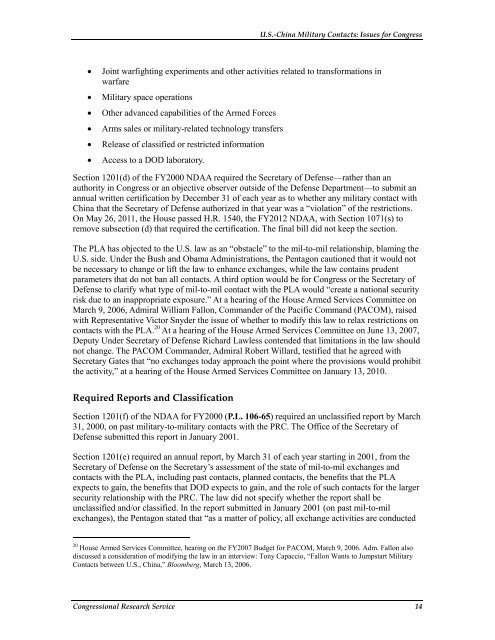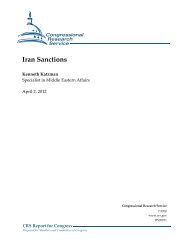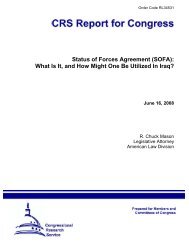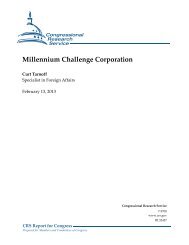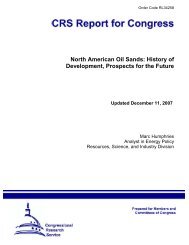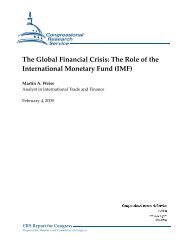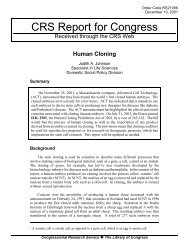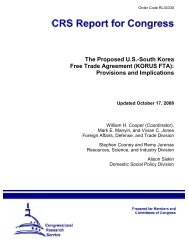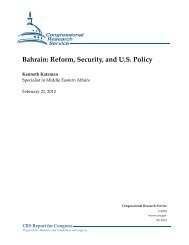U.S.-China Military Contacts: Issues for Congress - Foreign Press ...
U.S.-China Military Contacts: Issues for Congress - Foreign Press ...
U.S.-China Military Contacts: Issues for Congress - Foreign Press ...
You also want an ePaper? Increase the reach of your titles
YUMPU automatically turns print PDFs into web optimized ePapers that Google loves.
U.S.-<strong>China</strong> <strong>Military</strong> <strong>Contacts</strong>: <strong>Issues</strong> <strong>for</strong> <strong>Congress</strong><br />
• Joint warfighting experiments and other activities related to trans<strong>for</strong>mations in<br />
warfare<br />
• <strong>Military</strong> space operations<br />
• Other advanced capabilities of the Armed Forces<br />
• Arms sales or military-related technology transfers<br />
• Release of classified or restricted in<strong>for</strong>mation<br />
• Access to a DOD laboratory.<br />
Section 1201(d) of the FY2000 NDAA required the Secretary of Defense—rather than an<br />
authority in <strong>Congress</strong> or an objective observer outside of the Defense Department—to submit an<br />
annual written certification by December 31 of each year as to whether any military contact with<br />
<strong>China</strong> that the Secretary of Defense authorized in that year was a “violation” of the restrictions.<br />
On May 26, 2011, the House passed H.R. 1540, the FY2012 NDAA, with Section 1071(s) to<br />
remove subsection (d) that required the certification. The final bill did not keep the section.<br />
The PLA has objected to the U.S. law as an “obstacle” to the mil-to-mil relationship, blaming the<br />
U.S. side. Under the Bush and Obama Administrations, the Pentagon cautioned that it would not<br />
be necessary to change or lift the law to enhance exchanges, while the law contains prudent<br />
parameters that do not ban all contacts. A third option would be <strong>for</strong> <strong>Congress</strong> or the Secretary of<br />
Defense to clarify what type of mil-to-mil contact with the PLA would “create a national security<br />
risk due to an inappropriate exposure.” At a hearing of the House Armed Services Committee on<br />
March 9, 2006, Admiral William Fallon, Commander of the Pacific Command (PACOM), raised<br />
with Representative Victor Snyder the issue of whether to modify this law to relax restrictions on<br />
contacts with the PLA. 20 At a hearing of the House Armed Services Committee on June 13, 2007,<br />
Deputy Under Secretary of Defense Richard Lawless contended that limitations in the law should<br />
not change. The PACOM Commander, Admiral Robert Willard, testified that he agreed with<br />
Secretary Gates that “no exchanges today approach the point where the provisions would prohibit<br />
the activity,” at a hearing of the House Armed Services Committee on January 13, 2010.<br />
Required Reports and Classification<br />
Section 1201(f) of the NDAA <strong>for</strong> FY2000 (P.L. 106-65) required an unclassified report by March<br />
31, 2000, on past military-to-military contacts with the PRC. The Office of the Secretary of<br />
Defense submitted this report in January 2001.<br />
Section 1201(e) required an annual report, by March 31 of each year starting in 2001, from the<br />
Secretary of Defense on the Secretary’s assessment of the state of mil-to-mil exchanges and<br />
contacts with the PLA, including past contacts, planned contacts, the benefits that the PLA<br />
expects to gain, the benefits that DOD expects to gain, and the role of such contacts <strong>for</strong> the larger<br />
security relationship with the PRC. The law did not specify whether the report shall be<br />
unclassified and/or classified. In the report submitted in January 2001 (on past mil-to-mil<br />
exchanges), the Pentagon stated that “as a matter of policy, all exchange activities are conducted<br />
20 House Armed Services Committee, hearing on the FY2007 Budget <strong>for</strong> PACOM, March 9, 2006. Adm. Fallon also<br />
discussed a consideration of modifying the law in an interview: Tony Capaccio, “Fallon Wants to Jumpstart <strong>Military</strong><br />
<strong>Contacts</strong> between U.S., <strong>China</strong>,” Bloomberg, March 13, 2006.<br />
<strong>Congress</strong>ional Research Service 14


